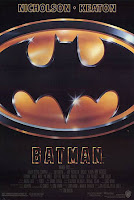 Directed by: Tim Burton
Directed by: Tim BurtonWritten by: Sam Hamm, Warren Skaaren
Long before he became a Johnny-Depp obsessed caricature of himself, Tim Burton established a modernized vision of Batman which broke from the classic but cartoonish Batman of the Adam West era.
In the beginning of the film, Batman (Keaton) is a mysterious vigilante who is feared despite the fact that most people think he is merely an urban legend. The caped crusader's rise to fame coincides with the Joker's (Nicholson) rise to power in Gotham City's criminal element. The two tussle it out for a while, and the good guy wins. (There's also a sub-plot in there about Bruce Wayne falling in love with Vicky Vale [Basinger], a photo-journalist on Batman's trail, which eventually overlaps with the main plot.)
It's hard, in the shadow of Heath Ledger's later acclaimed performance, to put some perspective on Jack Nicholson's take on the Joker. But Nicholson's performance in this film was totally earth-shaking. He managed to tie his work to the Jokers of the Adam West era (especially with his terrifying cackle) while also forging new ground with the character's deadly charisma. It's unfortunate that he never had an opportunity to reprise the role and develop his Joker any further.
Beyond Jack Nicholson, the entire cast should be credited for filling out their roles well, regardless of the number of lines and scenes they had. Jack Palance dazzles, as always. Michael Gough establishes the gold standard for Alfred, Bruce Wayne's butler (sorry Michael Caine). It's too bad that Billy Dee Williams didn't get enough of a chance to flesh out his part as up-and-coming DA Harvey Dent, but his handful of scenes revealed a lot of potential that never was harnessed.
To be honest, the special effects and sets did not hold up since the film's original release. (This problem was magnified because I saw it on the big screen as part of a local theater's classic film series.) There's a low-budget sense to the movie, despite the fact that it was a big-budget movie at the time. For example, the different settings are relatively blank and ill-defined. There is no sense of scope or scale for Gotham City - locales seemed to be created as mere background spaces for the characters to interact, with nothing to differentiate one street corner from another. Considering that Gotham is supposed to be an extremely large city, most of the scenes are noticeably devoid of people, or any feeling of hustle-and-bustle.
Earlier, I mentioned Tim Burton's deterioration as a filmmaker. "Batman" stands as a testament to the potential he had as a director. It's a dark and weird film (and the series got darker and weirder with his sequel, "Batman Returns"), and stands out as a classic of the superhero genre. He took the Batman concept and gave it his own flavor, re-envisioning the archetype and leaving this film as a touchstone by which other superhero films were measured for a long time. I hope Tim Burton can eventually come back to the creative muse that inspired him to make "Batman," rather than resting on his laurels and his name and pumping out lame unimaginative rehashes of previously brilliant films which are mostly popular because they have the name Johnny Depp attached to them, as he has of late.
No comments:
Post a Comment